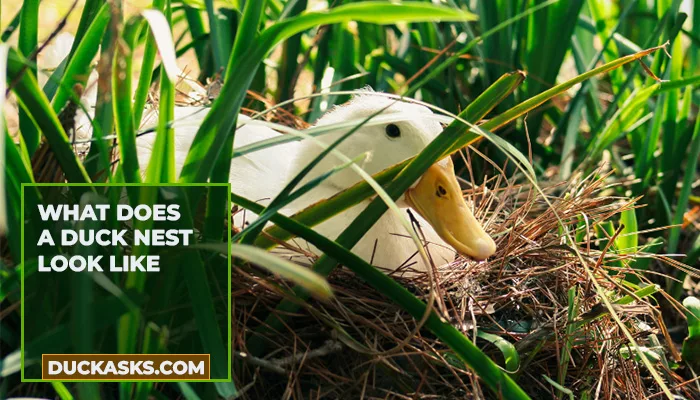Are Eggs in a Duck Nest Supposed to Be Cold?
If we are talking about keeping duck eggs in the fridge for consumption, then a cold egg can be refrigerated anywhere from 2 weeks to 6 months till they are consumed. When it comes to duck nesting, there are a lot of questions that can arise. One of the more common questions is: Are eggs in a duck nest supposed to be cold?
The answer may not be as simple as it seems, as this depends on many factors such as the species of duck, the climate, the nesting materials, and more.
In this article, we’ll take a look at all of these factors to try and answer this question once and for all. So, let’s take a deeper dive into the world of duck nesting and see what we can find out!
Interested in similar topics on ducks habitat:
How Long Can a Fertile Duck Egg Be Cold?
Duck eggs meant for incubation or hatching must be under 90 degrees Fahrenheit for them to retain the conditions to hatch. If the eggs are left in the cold lower than that, then they might survive depending on how long they’ve been in that condition.
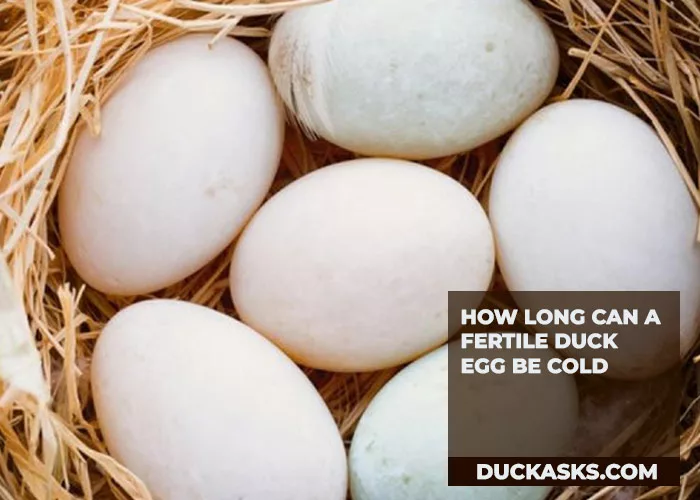
However, if left in conditions that are too cold for too long, then they are no longer retrievable to hatch. The time limit for this condition to be met is 18 hours.
So, any longer than that, you are potentially entering a red zone for hatching. That too, with respect to how cold it was at the time.
What Does It Mean If My Duck’s Eggs Are Cold?
This question can only be answered contextually with respect to time. It is important to know and understand under what conditions the eggs have become cold and for how long.
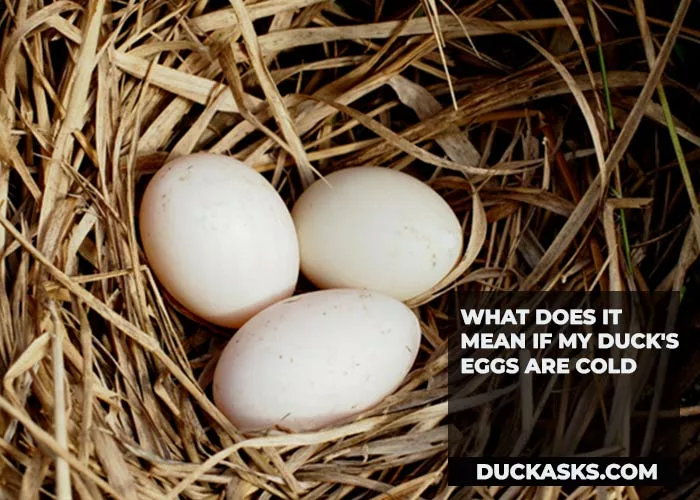
The temperature changes during that period also need to be taken into account. Essentially it means that the eggs have not been sat on for a while or yet.
So if a duck’s egg are too cold then it is safe to say that that particular batch of eggs will not hatch into ducklings and are better used as food.
Why Are Duck Eggs Usually Cold?
The composition of duck eggshells is such that it protects the egg from environmental and internal temperature changes. At the same time, the yolk inside has all the nutrients to support the embryo for a while.
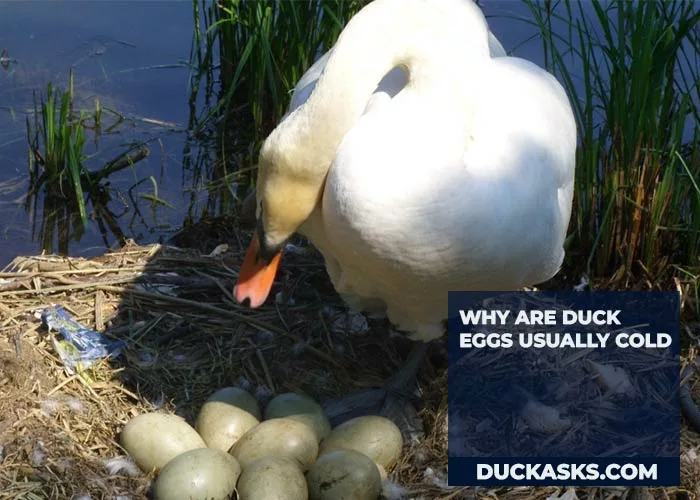
This is so that the mother duck has time to sit on the egg to act as a source of heat. Occasionally, it takes a while for mother ducks to recognize the fact that they need to sit on their eggs to hatch them.
Due to the eggs and duck’s nature, it works out perfectly!
Do All Duck Eggs Stay Cold?
Generally speaking, all duck eggs stay cold until they are sat on by their mother ducks. The way nature works, mother ducks have a free period before they have to sit on their yet-to-hatch ducklings.

During that period, unless the eggs are kept in a controlled environment, they are bound to stay cold. And that goes for all types of eggs.
No egg in the animal kingdom has the ability to heat itself, as ironic as it sounds.
How to Keep Duck Eggs Cold?
If it is for the case of consumption, it is generally accepted if the eggs are kept at 44 degrees Fahrenheit or lower. It is best to keep the eggs in the carton they came in and away from food that can transfer their pungent smell onto the eggs.
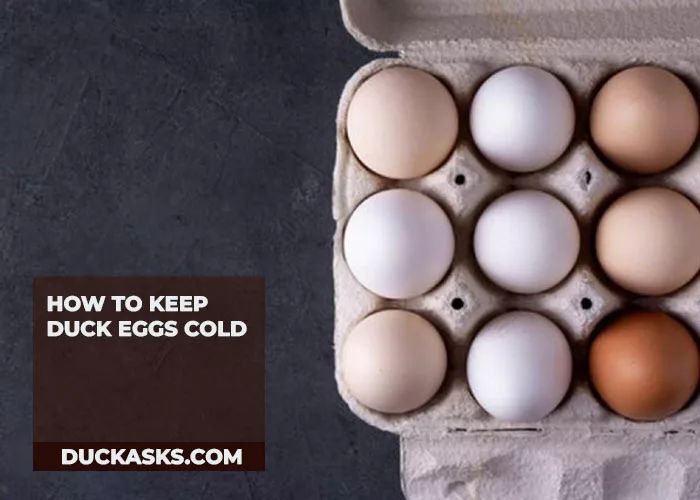
This is all only applicable if the eggs are still shelled. If eggs are deshelled and raw, then they need to be kept in a tight container, preferably airtight.
Additionally, you can add water on top of the yolk to keep it safe. The water acts as a barrier or protective layer in front of the yolk.
The water keeps debris or other particles in the air from coming in contact with the yolk.
What Happens to a Duck Egg If They Get Too Cold?
Worst case scenario, you’ll have a raw egg ice cream in your fridge rotting away before anyone can have the chance to taste it. Otherwise, if a duck egg gets too cold, then most likely, you will not be able to hatch it.
The temperature of the egg is crucial when trying to hatch the egg. If it is too cold, then it will not be possible to bring it back to a condition where you can hatch it.
How Cold Is Too Cold for Duck Eggs?
Ducks’ eggs need to be around 90 degrees Fahrenheit for them to hatch. Anything below that might compromise the condition of the embryo and the young duckling inside.
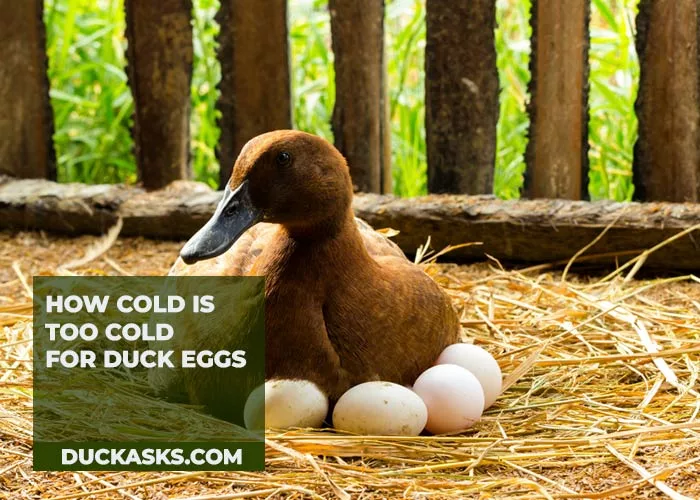
Generally speaking, 60-70 degrees Fahrenheit is the danger zone for duck eggs. This is only 20 degrees higher than the required temperature to keep an egg relatively fresh in the fridge for almost 6 months.
That’s a good representation of what type of temperature a duck should be in.
Will Fertile Eggs Hatch If They Get Too Cold?
It is unlikely that the embryo of an egg will survive under 90 degrees Fahrenheit.
There is a slight chance that it might, but only if the time it spends in that condition is very short. Even then, it is very risky.

That being said, if a fertile egg gets too cold, then it is more than probable that it will not hatch. Since eggs are very temperature sensitive, any deviation from the ideal temperature might endanger the youngling inside.
In fact, it might even cause them to develop disproportionately. This can come in the form of them having a compromised immune system or even physical deformities.
Conclusion
The short answer is duck eggs are naturally supposed to be cold, but they will not normally survive in conditions that are anything but ideal.
There is always the chance of them making it through if a miracle occurs, but it is best not to hope for one. If it can be avoided, then it is the person taking care of the incubation to make sure that ideal temperatures are maintained.
Or if the ducks are going to sit on the eggs to make sure that they do not spend too much time away from their new to be born.
That’s it for this article! We hope that you’ve found what you were looking for. If you did, then share this article. Stay connected with us on Facebook, Twitter, and Pinterest.
Article References:
- Incredibleegg.org/recipes/egg-tips-tricks/egg-storage
Image Credits:
- stock.adobe.com
- canva.com/photos


